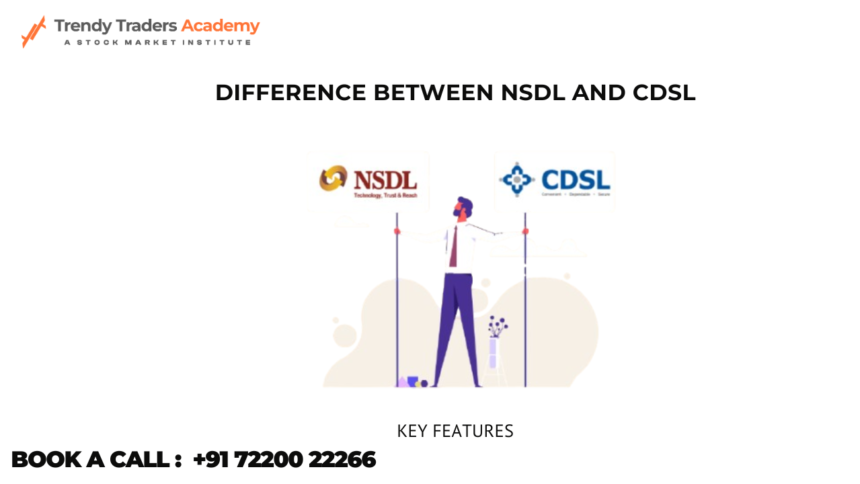Difference Between NSDL and CDSL
Introduction
If you’re stepping into the world of share trading, you’ve probably come across the terms NSDL and CDSL. Ever wondered what these terms mean and why they matter? Think of NSDL and CDSL as digital lockers for your shares, ensuring your investments are safe, just like your personal documents in a physical locker. In this article, we’ll break down the differences between NSDL and CDSL, their features, and how they function in India’s financial ecosystem. And if you’re in Bangalore, we’ll also guide you on how to enhance your trading skills with the best stock market courses and training options available.
Learn the difference between NSDL and CDSL , key features, and their role in share trading. Explore stock market courses in Bangalore .
What Are NSDL and CDSL ?
Imagine you’ve bought a share in a company. Where does that share go? Unlike physical share certificates of the past, shares today are stored digitally. NSDL (National Securities Depository Limited) and CDSL (Central Depository Services Limited) are India’s two main depositories, providing electronic storage for your securities.
The Role of Depositories
Depositories are like banks, but instead of money, they hold your securities—shares, bonds, mutual funds, and more. They ensure safe storage, quick transfers, and seamless ownership changes. NSDL and CDSL ensure that your investments are both secure and accessible.
Key Features of NSDL
- Establishment: NSDL was the first depository in India, established in 1996.
- Parent Entity: Promoted by institutions like the NSE (National Stock Exchange).
- Reach: Extensive network of depository participants (DPs).
- Services: Facilitates holding and transfer of shares, bonds, ETFs, and more.
- Technology: NSDL’s systems are renowned for being robust and technologically advanced.
Key Features of CDSL
- Establishment: Founded in 1999, CDSL is the second depository in India.
- Parent Entity: Promoted by the BSE (Bombay Stock Exchange).
- Focus: Caters primarily to individual investors and smaller brokerage firms.
- Accessibility: Known for its user-friendly interface and streamlined processes.
- Services: Offers similar services as NSDL but with a focus on retail investors.
NSDL vs CDSL : A Detailed Comparison
| Aspect | NSDL | CDSL |
| Year Established | 1996 | 1999 |
| Promoter | NSE | BSE |
| Target Audience | Institutional investors, large firms | Retail investors, smaller brokers |
| Market Share | Higher market share | Competitive pricing for retail clients |
| Technological Edge | Advanced systems | Simpler, user-friendly systems |
Why Are Depositories Important?
Depositories eliminate the risk of losing physical share certificates and reduce paperwork. They simplify the buying, selling, and transferring of securities, making stock trading safer and faster for everyone.
How to Choose the Right Depository Participant ?
Depository Participants (DPs) act as intermediaries between you and the depositories. Consider these factors when choosing a DP:
- Reputation: Look for a trusted brand.
- Charges: Compare account maintenance and transaction fees.
- Services: Opt for value-added services like research reports and trading tips.
- Convenience: Ensure easy access through mobile apps or online platforms.
Role of NSDL and CDSL in Share Trading
Every time you buy or sell shares, the depository—via its DP—plays a key role. It ensures your trades are settled, securities are transferred, and records are updated efficiently.
Benefits of Stock Trading Training in Bangalore
Bangalore, a bustling hub of innovation, offers a range of courses to kickstart your trading journey. Here’s why training matters:
- Practical Knowledge: Learn how the stock market operates.
- Skill Development: Master tools for analysis and trading.
- Networking Opportunities: Connect with experienced traders and mentors.
- Real-World Insights: Get hands-on experience with live trading sessions.
Stock Market Courses in Bangalore
Bangalore is home to several institutes that provide high-quality stock market training. From basic courses to advanced modules in options trading and technical analysis, there’s something for everyone. Look for courses offering:
- Experienced Trainers: Learn from industry experts.
- Flexible Timings: Suitable for students and working professionals.
- Comprehensive Curriculum: Covers fundamentals, strategies, and live trading.
How to Start Your Share Trading Journey ?
Starting can be overwhelming, but it doesn’t have to be. Follow these steps:
- Open a Demat and Trading Account: Choose a DP registered with NSDL or CDSL.
- Learn the Basics: Understand key concepts like stocks, indices, and market trends.
- Take a Course: Enroll in a stock market course to build your skills.
- Practice with Paper Trading: Simulate trades without real money.
- Invest Small: Start with a modest amount and diversify your portfolio.
Digital Safety Tips for Investors
- Secure Your Credentials: Use strong passwords for your accounts.
- Beware of Phishing Scams: Avoid clicking on suspicious links.
- Enable Two-Factor Authentication: Add an extra layer of security.
- Monitor Statements Regularly: Check your account activity frequently.
Importance of Choosing the Right Training Program
A well-structured training program can be the difference between guesswork and informed decisions in the stock market. When choosing a program, ensure it offers:
- Customizable Learning Paths: Courses should cater to beginners, intermediate, and advanced traders.
- Market Simulations: The best programs include practical trading environments.
- Access to Tools: Hands-on training with trading platforms like Zerodha or Upstox.
- Ongoing Mentorship: Look for programs offering post-course support.
Common Myths About NSDL and CDSL
There are many misconceptions about how depositories work. Let’s debunk a few:
- Myth 1: “You need to choose one depository.”
Fact: You can have accounts linked to both. - Myth 2: “Depositories charge high fees.”
Fact: Fees are charged by the DP, and they’re typically minimal. - Myth 3: “Physical certificates are safer.”
Fact: Digital securities eliminate risks like loss or forgery.
How NSDL and CDSL Contribute to India’s Financial Growth
Depositories have revolutionized India’s financial landscape:
- Efficiency: Trades settle faster, ensuring a seamless trading experience.
- Transparency: Every transaction is recorded, enhancing accountability.
- Global Standards: Their systems align with international practices, boosting foreign investment.
How Stock Market Knowledge Empowers Investors
Understanding concepts like NSDL, CDSL, and depositories equips investors to:
- Make Informed Decisions: Reduce dependence on brokers.
- Leverage Market Opportunities: Spot and act on trends quickly.
- Build Confidence: Trade with a clear understanding of risks and rewards.
Enhancing Your Learning With Online Resources
While classroom training in Bangalore is valuable, online resources can supplement your learning:
- Webinars: Many platforms offer free or paid sessions by experts.
- Blogs and Podcasts: Stay updated with market trends and analysis.
- Apps for Beginners: Try StockEdge, Moneycontrol, or TradingView.
Conclusion
Understanding the difference between NSDL and CDSL is essential for every investor. Both play crucial roles in ensuring the safety and efficiency of your trades. If you’re based in Bangalore, this is the perfect time to explore stock trading training and courses to elevate your skills. Remember, the right knowledge and tools can turn the stock market from a maze into an opportunity.
FAQ’S
1. What is the primary difference between NSDL and CDSL ?
NSDL primarily caters to institutional investors, while CDSL focuses more on retail investors. Both offer similar services but differ in their approach and audience.
2. Can I hold accounts in both NSDL and CDSL ?
Yes, you can open Demat accounts with DPs linked to both NSDL and CDSL for added flexibility.
3. Are stock market courses in Bangalore worth it ?
Absolutely! trading classes bangalore provide practical insights, skill development, and networking opportunities essential for successful trading.
4. How do I choose the best stock trading training in Bangalore ?
Look for institutes with experienced mentors, comprehensive curriculums, and positive student reviews.
5. Is it safe to store shares digitally with NSDL or CDSL ?
Yes, both depositories follow stringent security measures to protect your investments from fraud and cyber threats.
6. How do I open a Demat account with NSDL or CDSL ?
Choose a registered DP, complete the KYC process, and submit the necessary documents. Accounts are typically activated within a few days.
7. What are some recommended stock trading institutes in Bangalore ?
Look for reputed names like Trendy Traders Academy, NIFM, or smaller niche centers specializing in options trading and technical analysis.
8. What’s the difference between a Demat and a Trading account ?
A Demat account holds your securities digitally, while a trading account facilitates buying and selling them.
9. Can I transfer shares between NSDL and CDSL accounts ?
Yes, you can transfer shares using the inter-depository transfer process, which usually takes a few days.
10. Are there any government regulations protecting investors using depositories ?
Yes, SEBI (Securities and Exchange Board of India) regulates depositories to ensure investor protection.



